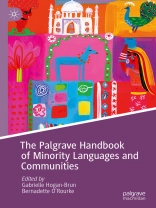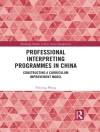This Handbook is an in-depth appraisal of the field of minority languages and communities today. It presents a wide-ranging, coherent picture of the main topics, with key contributions from international specialists in sociolinguistics, policy studies, sociology, anthropology and law. Individual chapters are grouped together in themes, covering regional, non-territorial and migratory language settings across the world. It is the essential reference work for specialist researchers, scholars in ancillary disciplines, research and coursework students, public agencies and anyone interested in language diversity, multilingualism and migration.
قائمة المحتويات
Introduction.- Chapter 1: Minority Languages and Communities in a Changing World; Gabrielle Hogan-Brun and Bernadette O’Rourke.- Part I: Minority Language Rights, Protection, Governance.- Chapter 2: Minority Language Rights and Standards: Definitions and Applications at the Supra-national Level; Fernand de Varennes and Elzbieta Kuzborska.- Chapter 3: Minority Language Rights in the Russian Federation: The End of a Long Tradition?; Bill Bowring.- Chapter 4: Minority Languages, Governance and Regulation; Colin Williams and John Walsh.- Part II: Recognition, Self-determination, Autonomy.- Chapter 5: The Recognition of Ethnic and Language Diversity in Nation-States and Consociations; Christian Giordan.- Chapter 6: Linguistic Recognition in Deeply Divided Societies: Antagonism or Reconciliation?; Máiréad Nic Craith and Philip Mc Dermott.- Chapter 7: National Cultural Autonomy and Linguistic Rights in Central and Eastern Europe; David Smith, Federica Prina and Judit Molnar Sansum.- Chapter 8: Sign Language Communities; Maartje De Meulder, Verena Krausneker, Graham Turner and John Bosco Gonama.- Part III: Migration, Settlement, Mobility.- Chapter 9: Changing Perspectives on Language Maintenance and Shift in Transnational Settings: From Settlement to Mobility; Anne Pauwels .- Chapter 10: Arctic Languages in Canada in the Age of Globalisation; Donna Patrick.- Part IV: Economics, Markets, Commodification.- Chapter 11: Minority Languages and Markets; Sari Pietikäinen, Helen Kelly-Holmes and Maria Rieder.- Chapter 12: Language Economics and Issues of Planning for Minority Languages in Africa; Nkonko M. Kamwangamalu.- Chapter 13: Language Minorities in a Globalized Economy: The Case of Professional Translation in Canada; Matthieu Le Blanc.- Part V: Education, Literacy, Access.- Chapter 14: Indigenous Children’s Language Practices in Australia; Samantha Disbray and Gillian Wigglesworth.- Chapter 15: Minorities, Languages, Education and Assimilation in Southeast Asia; Peter Sercombe.- Chapter 16: Literacy in My Language? Principles, Practices, Prospects; Clinton Robinson.- Part VI: Media, Public Usage, Visibility.- Chapter 17: Minority Language Media: Issues of Power, Finance and Organization; Tom Moring.- Chapter 18: Minority Languages and Social Media; Daniel Cunliffe.- Chapter 19: Linguistic Landscapes and Minority Languages; Durk Gorter, Heiko Marten and Luk Van Mensel.- Part VII: Endangerment, Ecosystems, Resilience.- Chapter 20: Resilience for Minority Languages; David Bradley.- Chapter 21: Minority Contact Languages, Small Islands and Linguistic Ecology; Joshua Nash.- Chapter 22: The Yiddish Conundrum: A Cautionary Tale for Language Revivalism; Dovid Katz.
عن المؤلف
Gabrielle Hogan-Brun is Senior Research Fellow at the University of Bristol, UK. She is founding editor of the book series Palgrave Studies in Minority Languages and Communities, and has published widely on language policy and practices in multilingual settings. Her most recent book is
Linguanomics: What is the Market Potential of Multilingualism? (2017). A Salzburg Global Fellow, she has worked with various European organizations on aspects of language policy and economics.
Bernadette O’Rourke is Professor of Sociolinguistics at Heriot-Watt University, UK. She has published work on the dynamics of multilingual societies, language policy and minority language communities. She holds a Fellowship at the Smithsonian Center for Folklife and Cultural Heritage and is currently exploring grassroots revitalization efforts in Galicia as part of its interdisciplinary research programme on Sustaining Minoritized Languages in Europe (SMi LE).












